
The Politics of Pakistan takes place within the framework established by the constitution. The country is a federal parliamentary republic in which provincial governments enjoy a high degree of autonomy and residuary powers. Executive power is vested with the national cabinet which is headed by Prime Minister of Pakistan,who works with the bicameral parliament and the judiciary. Stipulations set by the constitution provide a delicate check and balance of sharing powers between executive,legislative,and judicial branches of the government.

The Constitution of Pakistan,also known as the 1973 Constitution,is the supreme law of Pakistan. The document guides Pakistan's law,political culture,and system. It sets out the state's outline,the fundamental rights of the population,the state's law and orders,and also the structure and establishment of the institutions and the armed forces. Drafted by the government of Zulfikar Ali Bhutto,with additional assistance from the country's opposition parties,it was unanimously approved by the 5th Parliament on 10 April and ratified on 14 August 1973. The first three chapters establish the rules,mandate,and separate powers of the three branches of the government:a bicameral legislature;an executive branch governed by the Prime Minister as chief executive;and an apex federal judiciary headed by Supreme Court. The Constitution designates the President of Pakistan as a ceremonial Head of State who is to represent the unity of the state. The first six articles of the constitution outline the political system as federal parliamentary republic system;as well as Islam as its state religion. The Constitution also encapsulates provisions stipulating the legal system's compliance with Islamic injunctions contained in the Quran and Sunnah.

The President of Pakistan is the head of state of the Islamic Republic of Pakistan. The president is the nominal head of the executive and the Commander-in-chief of the Pakistan Armed Forces. The Presidency is a ceremonial position in Pakistan. The President is bound to act on advice of Prime Minister and cabinet. Asif Ali Zardari is the current President since 10 March 2024.
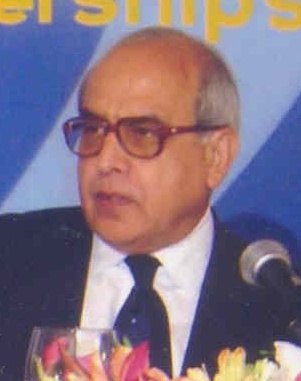
Farooq Ahmad Khan Leghari,was a Pakistani politician who served as the eighth president of Pakistan from 14 November 1993 until resigning on 2 December 1997. He was the first Baloch to be elected as President.

The prime minister of Pakistan is the head of government of the Islamic Republic of Pakistan. Executive authority is vested in the prime minister and his chosen cabinet,despite the president of Pakistan serving as the nominal head of executive. The prime minister is often the leader of the party or the coalition with a majority in the lower house of the Parliament of Pakistan,the National Assembly where he serves as Leader of the House. Prime minister holds office by virtue of their ability to command the confidence of the National Assembly. The prime minister is designated as the "chief executive of the Islamic Republic".
The President of Pakistan is chosen by an electoral college,in Pakistan. According to Article 41(3) of the Constitution of Pakistan,this electoral college consists of the Senate,the National Assembly of Pakistan,and the Provincial Assemblies of the four provinces. Members of the National Assembly and Provincial Assemblies are directly elected by the people in competitive multi-party elections. Members of the Senate are indirectly elected by the provincial assemblies,for a term of six years.
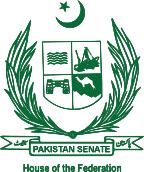
The Senate of Pakistan or Aiwān-e-BālāPākistān,constitutionally the House of the Federation,is the upper house of the bicameral Parliament of Pakistan. As of 2023,It has a maximum membership of 96,of which 92 are elected by the provincial legislatures using single transferable vote. Four represent the Federal Capital. Members sit for terms lasting six years,with half of the house up for election every three years. Unlike the National Assembly,the Senate is a continuing chamber and hence not subject to dissolution.

The National Assembly of Pakistan is the lower house of the bicameral Parliament of Pakistan,with the upper house being the Senate. As of 2023,the National Assembly has a maximum membership of 336,of which 266 are directly elected by an adult universal suffrage and a first-past-the-post system to represent their respective constituencies,while 70 are elected on reserved seats for women and religious minorities from all over the country. Members hold their seats for five years or until the house is dissolved by the President on the advice of the Prime Minister. The house convenes at the Parliament House,Red Zone,Islamabad.

The Parliament of Pakistan is the supreme legislative body of the Islamic Republic of Pakistan. It is a bicameral federal legislature,composed of the President of Pakistan and two houses:the Senate and the National Assembly. The president,as head of the legislature,has the power to summon or prorogue either house of the Parliament. The president can dissolve the National Assembly,only on the Prime Minister's advice.

Since its establishment in 1947,Pakistan has had a non-symmetric federal government and is a federal parliamentary democratic republic. At the national level,the people of Pakistan elect a bicameral legislature,the Parliament of Pakistan. The parliament consists of a lower house called the National Assembly,which is elected directly via first-past-the-post voting,and an upper house called the Senate,whose members are chosen by elected provincial legislators. The head of government,the Prime Minister,is elected by the majority members of the National Assembly and the head of state,the President,is elected by the Electoral College,which consists of both houses of Parliament together with the four provincial assemblies. In addition to the national parliament and the provincial assemblies,Pakistan also has more than five thousand elected local governments.

The Speaker of the National Assembly;informally as Speaker National Assembly,is the presiding official of the National Assembly of Pakistan–a lower house of the Parliament of Pakistan.

The chairman of the Senate of Pakistan is the president-chair of the Senate of Pakistan. According to the Constitution of Pakistan,the chairman is a presiding official and the Senate must choose a chairman and deputy chairman for a time interval of three years.
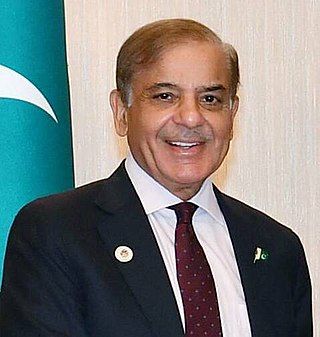
Mian Muhammad Shehbaz Sharif is a Pakistani politician and businessman who is currently serving as the 24th prime minister of Pakistan since March 2024,having previously served in the post from April 2022 to August 2023. He has also served as the president of the Pakistan Muslim League (N) (PML-N). Previously in his political career,he served as the chief minister of Punjab three times,making him the longest-serving chief minister of Punjab.
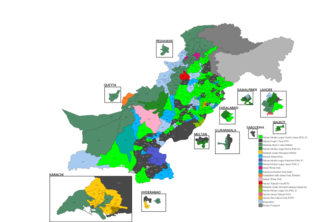
General elections were held in Pakistan on 10 October 2002 to elect the 12th National Assembly and four Provincial Assemblies. The elections were held under the military government of Pervez Musharraf. The two mainstream parties,Pakistan Peoples Party (PPP) and Pakistan Muslim League (N) (PML-N) had several restrictions imposed on them and their leaders Benazir Bhutto and Nawaz Sharif were in exile. In order to address the restrictions,PPP created the Pakistan Peoples Party Parliamentarians (PPPP) under the leadership of Ameen Faheem,to contest the elections on its behalf. The PML-N meanwhile,suffering from the party's division into two factions:one that remained loyal to Sharif and were contesting the elections under the leadership of Javed Hashmi,and the other which had broken away to form the pro-Musharraf Pakistan Muslim League (Q) (PML-Q) under the leadership of Mian Muhammad Azhar. The emergence of the PML-Q marked the beginning of multi-party politics in the country,bringing an end to the decade-long two-party system between the PPP and PML-N.
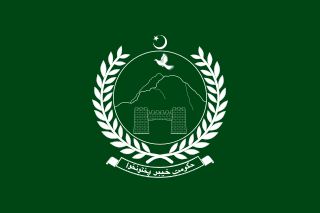
The Provincial Assembly ofKhyber Pakhtunkhwa is a unicameral legislature of elected representatives of the Pakistani province of Khyber Pakhtunkhwa,which is located in Peshawar,the provincial capital. It was established under Article 106 of the Constitution of Pakistan,having a total of 145 seats,with 115 general seats,26 seats reserved for women and 4 reserved for non-Muslims.
The Constitution of 1956 was the fundamental law of Pakistan from March 1956 until the 1958 Pakistani coup d'état. It was the first constitution adopted by independent Pakistan. There were 234 articles 13 parts and 6 schedules.
The Constitution of 1962 was the fundamental law of Republic of Pakistan from 8 June 1962 until martial law was declared in 25 March 1969. It was abrogated on 25 March 1969 by President Yahya Khan.










